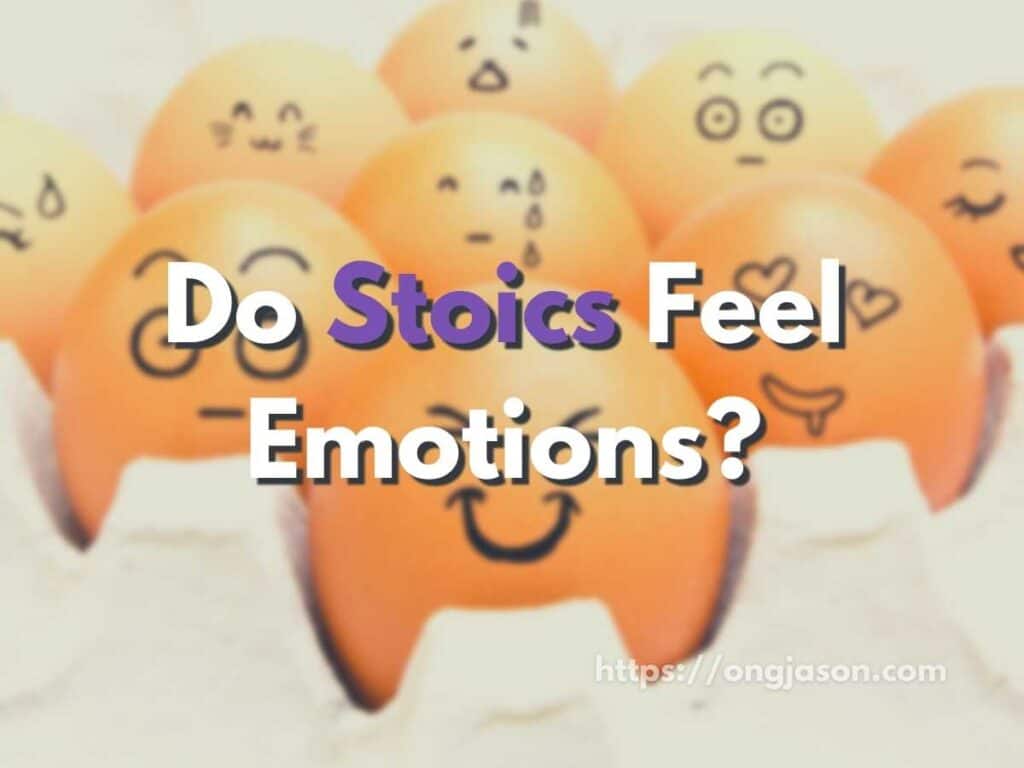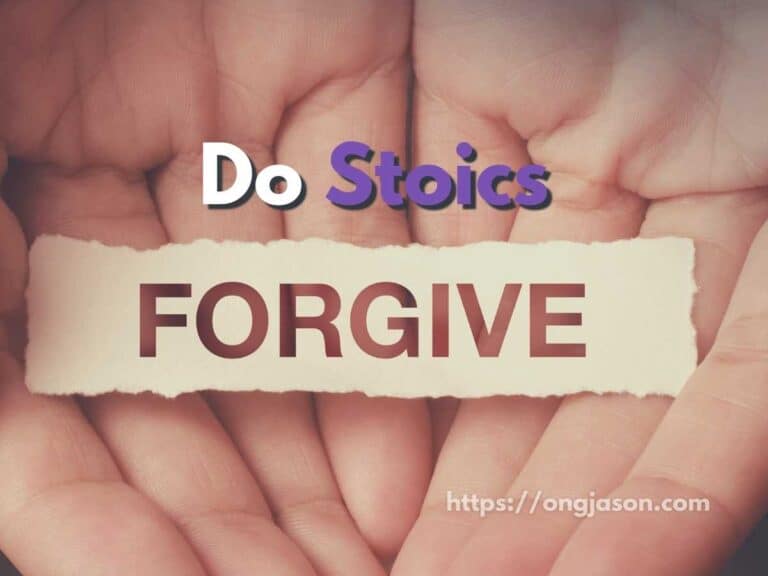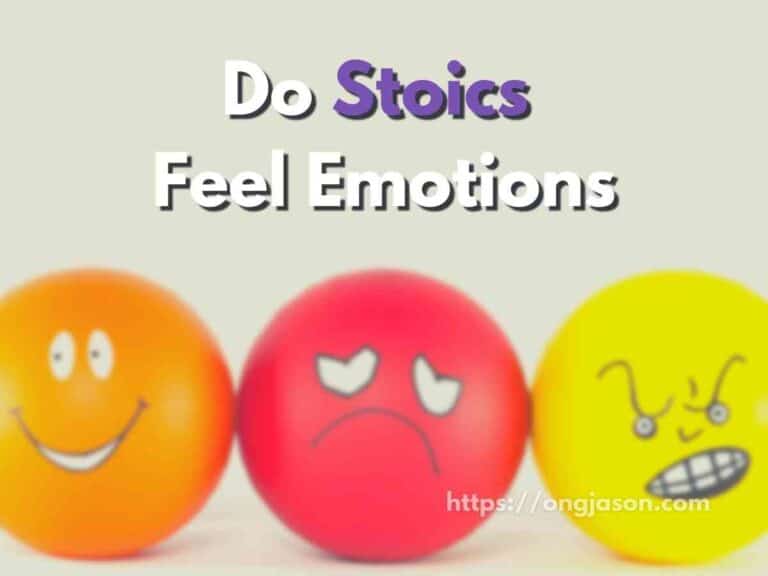Stoicism and Emotion: Do Stoics Feel Emotion?
To most people, Stoics seem like emotionless people. This is a common misconception since they associate Stoics with Vulcans on Star Trek. However, those are in movies. In reality, Stoics have a different approach towards emotions. So, do Stoics feel or show emotions?
Stoics show emotions as they believe that emotions are inevitable. There will be times where we will feel happiness, sadness, fear, courage, and other emotions. Thus, the Stoics feel and can show emotions. However, Stoicism teaches us that we can also control how we express these emotions.
In this blog post, we are going to talk about the relationship between Stoicism and emotions. What Stoics think about them and their approach to dealing or handling these emotions. My goal is to introduce you to the basic concepts of Stoicism so you’ll have a complete understanding of the topic.

Do Stoics feel emotion?
Stoics feel emotions because emotions are a part of being human. Since humans can feel emotions, so thus a Stoic. What makes a Stoic different from other people is that they believe while they can’t control having emotions, they can react appropriately to these emotions.
Stoics have a rule that seems to be one of the famous rules you’ll hear if you research Stoicism.
That rule is called the dichotomy of control.
For Stoics, there are things we can control and can’t control.
To them, it is a good idea to stop thinking about things we can’t control. Instead, focus on the things we can control.
That way, we won’t be stressed about useless things.
This is also why I talked about some things Batman did that made him not act like a Stoic. This is because a lot of people say that he’s a Stoic.
While Batman acts like a Stoic, there are times where he doesn’t. I talked about some of them in another blog post. So here is the link if you’re interested: Is Batman a Stoic?
I can’t talk about that in detail here since this blog post is about Stoicism and emotions.
So, why am I talking about the dichotomy of control?
The Stoics believe that feeling these emotions are outside our control.
It is usual for a human to feel different emotions across different circumstances. Thus, feeling emotions are out of our control.
If emotions are out of our control, we shouldn’t do something about it according to the dichotomy of control.
That means Stoics do feel emotions. They accept that fact, and in fact, they show emotions.
Stoics have emotions because emotions are an inevitable part of life. What Stoicism teaches us is that while we would always feel emotions, we can react appropriately to them. Stoics respond to emotions by examining the emotions and acting according to Stoic virtues.
What makes Stoics different is their view on emotions. Thus, we can act appropriately to them.
In fact, the Stoics also believe that emotions are not good or bad except if we put meaning into them.
For example, if we see fear as a means of running away from things, it can be bad.
However, if we see fear as a moment to demonstrate courage, it can be good.
There are no good or bad emotions. We only associate them with being good or bad.
We will talk about this later.
For now, despite all of these, why do Stoics look like someone who has no emotions?
That is because Stoics are staying away from one thing, which they call passion.
The Stoics believe that we need to accept emotion positively regardless of whether it looks negative to others.
However, if there is one thing they’re staying away from, that is passion.
To Stoics, passion is too many emotions to the point where it affects their rational thinking.
When your emotions hamper your logical thinking, then that’s passion.
For example, you can start lashing at everybody around you when you’re angry, which is entirely irrational.
The people around you might not even know that you’re upset.
Stoics don’t allow passion to hamper their judgment. They’re always trying to be rational by not letting emotion get into their way of thinking.
To do this, they learned how to deal with emotions rationally. That makes them different and look emotionless to others.
But the truth is, they also feel emotions since they’re also human.
What are emotions for Stoics?
For Stoics, emotions are an inevitable part of life. Everyone can feel emotions regardless of who they are. That’s why the Stoics believe that we should accept these emotions regardless of what they are. Also, the Stoics think that emotions have are neither good nor bad. It is our thinking that makes them so.
The Stoics think of emotions as something inevitable.
Think of emotions as our weather. It constantly changes, and it will always be there regardless of what we do.
That’s the perfect explanation of how Stoics think about emotions.
Since we can’t control emotions, we should accept them. But, instead, what we can do is react appropriately to them.
Sadly, we are not inherently good at handling these emotions.
Since I already compared emotions to the weather, which constantly changes, I would continue using it as an example.
Just because it is rainy today doesn’t mean that we should be shouting at everyone around us.
That might seem weird, but that happens to people.
Suppose we compare it with emotions. Just because we’re angry doesn’t mean that we should shout at everyone around us.
The Stoics see emotions in this light. We shouldn’t let the weather lose our rational thinking. We should also not let emotions or feelings do so.
But how do Stoics handle these emotions? I mean, it looks too good to be true to control these strong emotions.
I am going to introduce you to how Stoics handle emotions with a simple 3 step process.
How do Stoics handle emotions?
Stoics handle emotions with a three-step process which are accepting, examining, and doing. These three steps allow a Stoic to analyze emotions according to Stoic virtues carefully. Furthermore, this enables Stoics to handle strong emotions from a logical or rational perspective.
These steps came from my understanding of Stoicism.
Also, upon careful examination, I found that they use a simple 3 step process to handle emotions.
Here they are.
1. Acceptance
The first step is acceptance. Like I’ve told you earlier, emotions are always going to be with us.
Like the weather, we have no choice but to accept them.
Furthermore, we can’t deal with emotions if we don’t accept them in the first place.
Thus, following the dichotomy of control, the Stoics accept emotions as a normal part of life.
2. Examine
The next step is to examine these emotions.
Now that we accepted these emotions, we should now learn how to examine them.
In examining emotions, we need to understand that Stoics believe that emotions or feelings aren’t good or bad.
That means being sad is not bad. It is our label that being sad is bad that makes it bad.
An example is the emotions of fear.
If we examine fear as our innate ability to tell us that we have challenging times ahead, it can be good for us.
This is because fear lets us know that we need to prepare. So, our chance of succeeding will rise.
However, if we see fear as a time to always run away from the problem, or to never improve our lives, then it cannot be good for us.
What we have to do here is to give meaning to these emotions. We shouldn’t brand all sad things as bad or good.
This depends on the situation.
3. Do
The last step is to do.
Now that you’ve understood that Stoicism talks about not letting emotions hamper our logical thinking, we should now act based on our rational thinking.
Stoics act based on four virtues which are wisdom, justice, courage, and temperance.
You will see these virtues differently from other Stoics books. For example, they can also be prudence, morality, fortitude, and moderation.
There are no differences between these virtues. It is only a matter of translating these old Stoic texts to English.
But Stoics act based on these virtues. They live their lives trying to follow these four virtues.
For example, not shouting at your friends just because you’re in a bad mood is an act of prudence or wisdom.
Telling the truth regardless of the consequences is fortitude or courage.
Treating people equally regardless of who they are is morality or justice.
Not playing all night to break your sleep schedule is temperance or moderation.
What’s next? How about finding more about Stoicism and Empathy? Since Stoics may look not empathic to others, let’s find out here: Do Stoics Feel Empathy?

“Only the things I love.“
ongjason.com is reader-supported. When you buy through links on the site, I earn an affiliate commission.
If you’re following me, you’ll know that I believe it is essential to have some tools, whether it’s for personal development or lifestyle in general.
So, here are the things I love.
YouTube
If you want to learn things for free, I recommend watching my YouTube Channel. Click the Button Below to go straight into my Channel. 🙂
Okay, let me first explain my Channel.
I believe that I really can’t explain everything too well on my blog. That’s why I created a YouTube Channel so I can easily explain a lot of things. Plus, I believe that Video Sharing is the future.
Recommended Books
The next thing is books. Books are, for me, one of the cheapest ways to get invaluable information. We can learn personal development, finance, career, relationships, and many more from books.
Here, I will be listing my favorite books in different categories.
- For Beginners – 7 Habits of Highly Effective People by Stephen Covey – Personal development has a lot of concepts and ideas to learn. Thus it can be really hard for beginners to know where to start. Thus, I recommend this book since all the basic concepts of personal development are here(except finance, check what I recommended for that)
- Productivity – The One Thing by Gary Keller – This book teaches us the power of focusing on one thing which is the ultimate source of productivity. The concepts taught are what I am using to constantly publish YouTube videos while maintaining this website.
- Busy? – Make Time by Jack Knapp – This book teaches us how to make time for the things we love. The concept is really simple but I think that makes it a book worth reading.
- Health – Lifespan by Dr.Sinclair – This Book teaches about the latest scientific research on lifespan. In his book, he has shared numerous things he is doing to slow down his aging process. This can be as easy as eating less which he recommends.
- Finance – The Richest Man in Babylon by George Clason – Perhaps one of the first books I’ve read about Finance, this book for me is the best if we are talking about learning basic finance such as basic saving and investing. The concepts are very simple but effective.
Audiobooks
Take this advice as a grain of salt.
I don’t recommend buying Audiobooks one by one. I mean, audiobooks can be quickly finished by listening while working out or doing some mindless tasks.
So here is to save you some money. Just go for a monthly subscription to Audible. I believe that you will save a lot of money with that plus, they usually give freebies to anyone starting.
My Audiobook Recommendation will always be the same as my book recommendations, but I personally like The 5 Second Rule by Mel Robbins. I like how she is so casual while reading her book.







